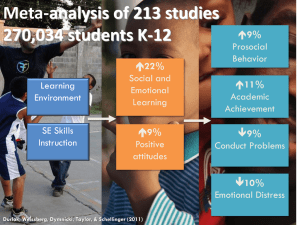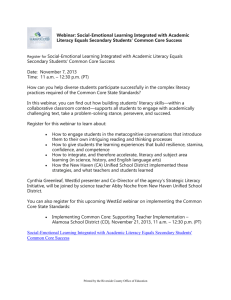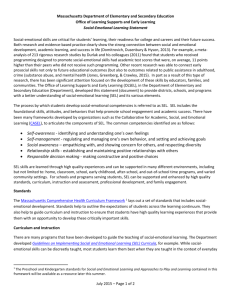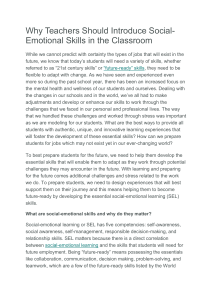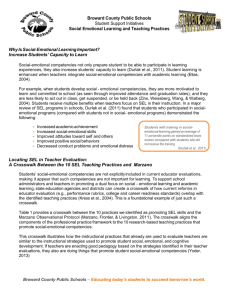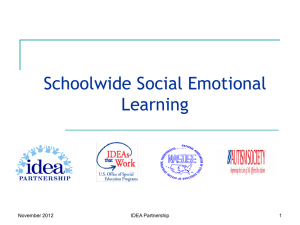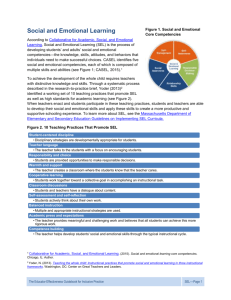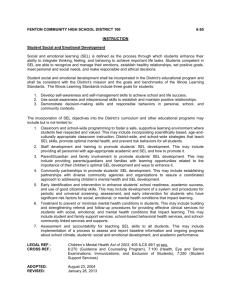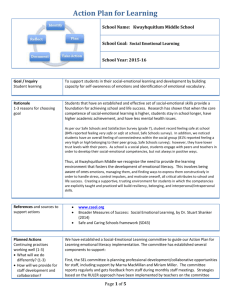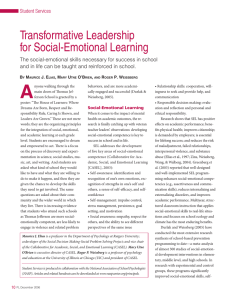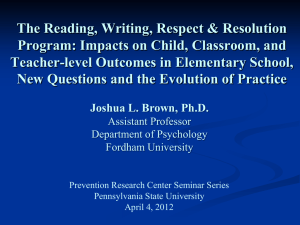Vivien Leary Cohort 34 (Sunday) EDU 590 Critical Issue Article
advertisement
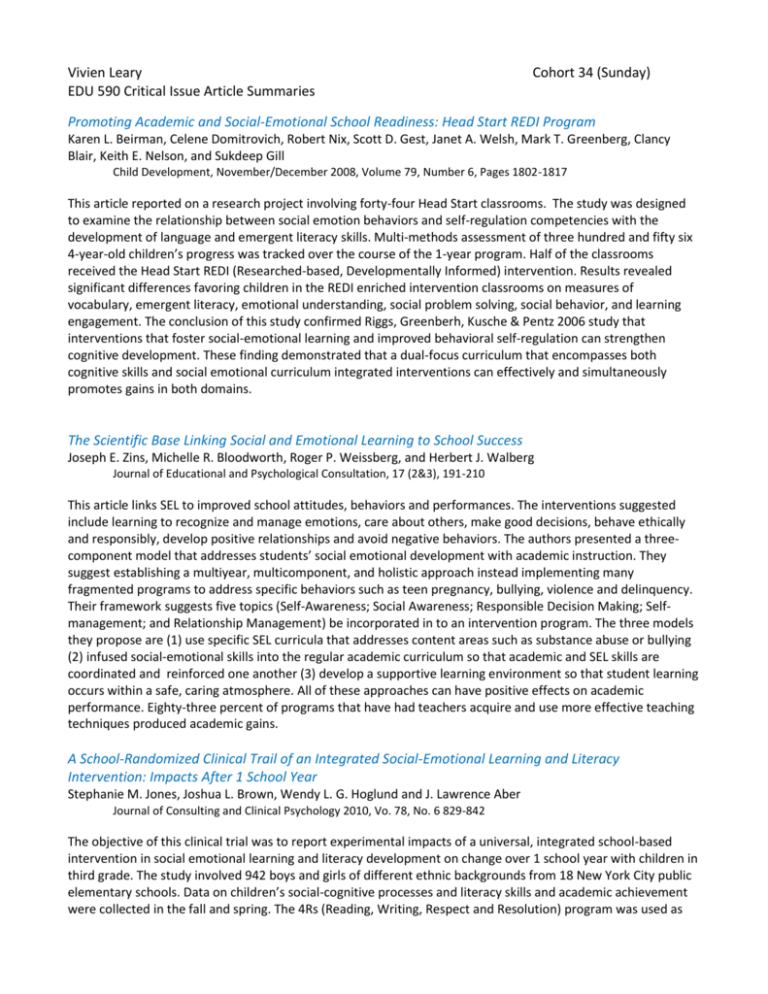
Vivien Leary EDU 590 Critical Issue Article Summaries Cohort 34 (Sunday) Promoting Academic and Social-Emotional School Readiness: Head Start REDI Program Karen L. Beirman, Celene Domitrovich, Robert Nix, Scott D. Gest, Janet A. Welsh, Mark T. Greenberg, Clancy Blair, Keith E. Nelson, and Sukdeep Gill Child Development, November/December 2008, Volume 79, Number 6, Pages 1802-1817 This article reported on a research project involving forty-four Head Start classrooms. The study was designed to examine the relationship between social emotion behaviors and self-regulation competencies with the development of language and emergent literacy skills. Multi-methods assessment of three hundred and fifty six 4-year-old children’s progress was tracked over the course of the 1-year program. Half of the classrooms received the Head Start REDI (Researched-based, Developmentally Informed) intervention. Results revealed significant differences favoring children in the REDI enriched intervention classrooms on measures of vocabulary, emergent literacy, emotional understanding, social problem solving, social behavior, and learning engagement. The conclusion of this study confirmed Riggs, Greenberh, Kusche & Pentz 2006 study that interventions that foster social-emotional learning and improved behavioral self-regulation can strengthen cognitive development. These finding demonstrated that a dual-focus curriculum that encompasses both cognitive skills and social emotional curriculum integrated interventions can effectively and simultaneously promotes gains in both domains. The Scientific Base Linking Social and Emotional Learning to School Success Joseph E. Zins, Michelle R. Bloodworth, Roger P. Weissberg, and Herbert J. Walberg Journal of Educational and Psychological Consultation, 17 (2&3), 191-210 This article links SEL to improved school attitudes, behaviors and performances. The interventions suggested include learning to recognize and manage emotions, care about others, make good decisions, behave ethically and responsibly, develop positive relationships and avoid negative behaviors. The authors presented a threecomponent model that addresses students’ social emotional development with academic instruction. They suggest establishing a multiyear, multicomponent, and holistic approach instead implementing many fragmented programs to address specific behaviors such as teen pregnancy, bullying, violence and delinquency. Their framework suggests five topics (Self-Awareness; Social Awareness; Responsible Decision Making; Selfmanagement; and Relationship Management) be incorporated in to an intervention program. The three models they propose are (1) use specific SEL curricula that addresses content areas such as substance abuse or bullying (2) infused social-emotional skills into the regular academic curriculum so that academic and SEL skills are coordinated and reinforced one another (3) develop a supportive learning environment so that student learning occurs within a safe, caring atmosphere. All of these approaches can have positive effects on academic performance. Eighty-three percent of programs that have had teachers acquire and use more effective teaching techniques produced academic gains. A School-Randomized Clinical Trail of an Integrated Social-Emotional Learning and Literacy Intervention: Impacts After 1 School Year Stephanie M. Jones, Joshua L. Brown, Wendy L. G. Hoglund and J. Lawrence Aber Journal of Consulting and Clinical Psychology 2010, Vo. 78, No. 6 829-842 The objective of this clinical trial was to report experimental impacts of a universal, integrated school-based intervention in social emotional learning and literacy development on change over 1 school year with children in third grade. The study involved 942 boys and girls of different ethnic backgrounds from 18 New York City public elementary schools. Data on children’s social-cognitive processes and literacy skills and academic achievement were collected in the fall and spring. The 4Rs (Reading, Writing, Respect and Resolution) program was used as the intervention. This program uses high-quality children’s literature as a springboard for helping students gain skills and understanding in the areas of handling anger, listening, assertiveness, cooperation, negotiation, mediation, building community, celebrating differences and countering bias. The program has two primary components; (a) a comprehensive 7-unit, 21-35 lesson, literacy-based curriculum in social emotional learning and (b) 25 hours of training followed by ongoing coaching of the teachers to support them in teaching the 4Rs curriculum. The results of this trial concluded that children with the highest level of aggression and depression should improvement in reading achievement scaled scores and children’s attendance. The researchers predict more gains with children that have less aggression and depression with continue use of the 4Rs program. One year was not enough time to see significant growth in all children. Emotional Intelligence: What Does the Research Really Indicate? Cary Cherniss, Melissa Extein, Daniel Goleman, and Roger P. Weissberg Educational Psychologist, 41(4), 239-245 This article discounts L. Waterhouse (2006) previous claims that emotional intelligence (EI) competencies should not be taught in schools. Waterhouse proclaims no distinction between emotional intelligence and personality plus IQ. These authors critique Waterhouse’s lack of a systematic approach and thorough review of actual published scientific literature. EI models recognize two broad components: awareness and management of one’s own emotions and awareness and management of others’ emotions. The authors contend that there is strong and growing base documenting the positive effects of school-based EI programing on students’ healthy development and academic performance. They examines several research syntheses and meta-analyses of school-based prevention programming that emphasizes that core components of SEL demonstrates the effectiveness of addressing social and emotional variables to enhance positive youth development and mental health, reduce substance abuse use and antisocial behavior, and improve educational outcomes. They also concluded from their research that students who participated in SEL programs compared to nonprogram peers liked school more, had significantly better attendance records, had higher grade point averages, and ranked at least 10 percentile points higher on academic achievement tests. Building Skills for School Success: Improving the Academic and Social Competence of Students Greg A. Brigman, Linda D. Webb, and Chari Campbell Professional School Counseling: February2007, Vol. 10 Issue 3, p279-288 The purpose of this article’s study was to evaluate the impact of the school counselor-led Student Success Skills program on academic and social competence of students. A randomized comparison group design was used to measure treatment outcomes for students in grades 5, 6, 8, and 9. The study involved 220 students from 12 schools. Half of the schools received the treatment. The Student Success Skills (SSS) program is designed to teach academic, social and self-management skills. In treatment schools, counselors implemented the SSS curriculum in both classroom and small group formats. This series of SSS studies grew out of previously reported research showing improved academic and social competence in young learners whose teachers used the Ready to Learn curriculum. The consistency of the results across this study and three subsequent SSS studies provide further support for the observed positive relationship between SSS intervention and student achievement outcomes. From their research three skills were identified, (a) cognitive and met-cognitive skills such as goal setting, progress monitoring and memory skills; (b) social skills such as interpersonal skills, social problem solving, listening, and teamwork skills; and (c) self-management skills such as managing attention, motivation and anger. The results of this research concluded that students who received the intervention scored significantly higher in math achievement and showed substantial improvement in behavior.
